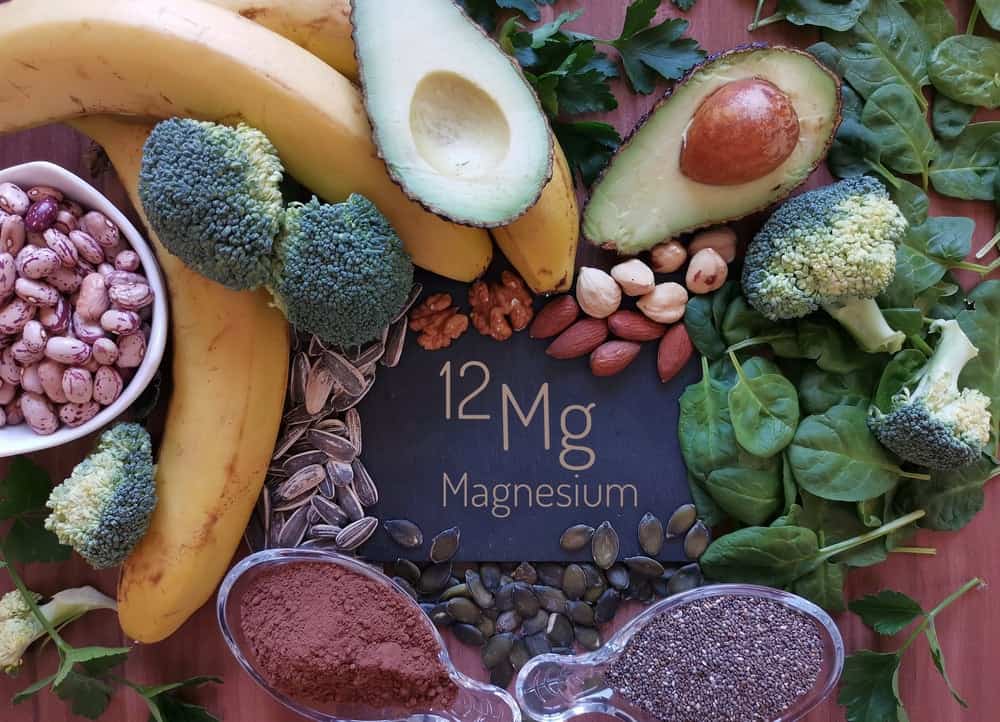Breastfeeding mothers often wonder if they can take vitamins and supplements to support their own health and the growth of their baby. One mineral that frequently comes into question is magnesium, due to its vital role in many bodily functions.
The good news is that magnesium can be taken during breastfeeding, provided that it is done in the appropriate manner and within recommended daily allowances.
Magnesium is essential for both the mother’s health and the development of the breastfeeding infant. It helps maintain proper electrolyte balance, muscle function, and bone health. However, the daily demands of nursing can lead to changes in magnesium requirements.
Consequently, it is crucial to understand how to meet the magnesium needs of both the breastfeeding mother and the infant safely and effectively.
Key Takeaways
- Magnesium can be taken during breastfeeding if done appropriately
- Meeting magnesium needs is important for the mother’s health and infant development
- Understanding magnesium requirements is crucial to support both mother and child.
The Importance of Magnesium

Magnesium is an essential mineral that plays a crucial role in various bodily functions. During pregnancy and the onset of lactation, the demand for magnesium increases as it helps support the growth and well-being of both the mother and the baby.
One of the primary roles of magnesium is to assist in energy production for the cells. It helps convert the nutrients from food into usable energy and supports the synthesis of proteins necessary for the growth and maintenance of tissues, including those of the developing baby.
Furthermore, magnesium aids in muscle and nerve function. Proper nerve impulse transmission and muscle relaxation are essential for preventing complications such as cramps and spasms that pregnant women may experience.
Maintaining an adequate level of magnesium could also contribute to better sleep quality, which is particularly important for expecting mothers.
During lactation, magnesium continues to be essential for both the mother and the baby. It helps promote proper milk production and supports the infant’s growth and development.
Additionally, magnesium may help maintain the mother’s emotional balance and reduce the likelihood of postpartum depression.
In conclusion, magnesium is a vital mineral that plays an essential role in the overall health and well-being of both the mother and the baby during pregnancy and breastfeeding.
Ensuring that the mother maintains adequate magnesium levels could lead to a smoother pregnancy, better lactation, and healthier growth for the infant.
Magnesium Requirements During Breastfeeding
Breastfeeding is a crucial period for both the mother and the baby, as it provides the infant with essential nutrients for growth and development. During lactation, a mother’s body undergoes hormonal and physiological changes to produce breast milk with the right balance of vitamins and minerals.
One of the essential minerals required during this period is magnesium.
Magnesium plays a vital role in the proper functioning of various bodily processes, including nerve and muscle function, bone health, and energy production. It is crucial for the mother’s overall health and aids the optimal development of the baby’s skeletal system.
The recommended daily intake of magnesium for breastfeeding women is about 310-360 mg, slightly higher than the requirement for non-lactating women.
Breast milk naturally contains magnesium, ensuring sufficient levels for the baby. The concentration of magnesium in breast milk generally remains consistent and is not significantly influenced by the mother’s dietary intake.
However, it is still essential for a breastfeeding mother to maintain an adequate magnesium intake to support her own health and well-being. Mothers can meet their magnesium needs through a balanced diet, including foods rich in magnesium, such as:
- Leafy green vegetables
- Nuts and seeds
- Whole grains
- Dairy products
- Legumes
In some cases, healthcare professionals may recommend magnesium supplements to breastfeeding mothers with a known deficiency or at risk of inadequate intake.
It is important to consult a medical expert before starting any supplementation during lactation, as the safety and proper dosage need to be properly assessed. Taking excessive amounts of magnesium can lead to adverse effects on both the mother and the baby.
In conclusion, ensuring an adequate magnesium intake during breastfeeding is crucial for the mother’s health and her baby’s growth and development. However, it is always best to consult a healthcare professional for personalized advice before starting any supplementation, as an individual’s needs may vary.
Benefits of Taking Magnesium

Magnesium is an essential mineral that offers various health benefits. For breastfeeding mothers, taking magnesium is considered safe and can promote better digestion, mental focus, improved sleep, and calcium absorption.
Adequate magnesium levels in the body can lead to better digestion for both the mother and her baby. Magnesium plays a vital role in the digestive process as it helps regulate muscle contractions and supports the function of digestive enzymes.
This, in turn, ensures smooth digestion and reduces the risk of constipation.
Breastfeeding mothers may experience increased mental stress and fatigue, which can be alleviated by magnesium supplementation. Magnesium has been found to support cognitive function, boost mood, and improve focus.
In addition, it helps in reducing the symptoms of stress, anxiety, and depression, thereby promoting overall mental well-being.
Another significant benefit of taking magnesium relates to sleep improvement. Adequate magnesium intake is known to promote better sleep by regulating neurotransmitters that are responsible for inducing relaxation and sleep.
Improved sleep patterns can help nursing mothers feel more rested and energized throughout the day.
Lastly, magnesium plays a crucial role in calcium absorption. Maintaining a proper balance between magnesium and calcium is essential for both mother and baby.
Adequate magnesium supports healthy bone development in the infant and helps prevent the risk of osteoporosis in the mother.
In conclusion, taking magnesium while breastfeeding can offer numerous health benefits. However, it is essential to consult a healthcare professional for appropriate dosage recommendations and to avoid potential risks or interactions with other medications.
Magnesium-Rich Foods

Breastfeeding mothers require a good source of nutrients, including magnesium, to support their own health and provide essential nutrients for the baby’s growth.
Incorporating magnesium-rich foods as part of a balanced diet is a great way to ensure optimal levels of magnesium.
Spinach is an excellent choice for those looking to increase their magnesium intake. It is a dark, leafy green vegetable that can be easily incorporated into a variety of dishes.
Similarly, alfalfa is another green source of magnesium, which can be consumed as fresh sprouts or in supplement form.
Avocado contains a decent amount of magnesium and is a versatile addition to any diet. Its creamy texture makes it perfect for spreading on toast or using in dips. It can also be added to smoothies for an extra boost of magnesium.
Nuts such as almonds, cashews, and peanuts are not only rich in magnesium, but they also provide healthy fats and protein. Consuming a handful of nuts as a snack or using peanut butter as a spread are good ways to ensure an adequate magnesium intake.
Black beans and tofu are other magnesium-rich sources that can be included in a variety of meals. Both can be used as a base for main dishes or as an add-in for salads and grain bowls.
Whole grains such as brown rice, quinoa, and whole wheat bread are fiber-rich options and also provide a good amount of magnesium. Replacing refined grains with whole grains can help improve overall nutrient intake.
Banana is a convenient and portable magnesium source that can be easily added to a breakfast meal, snack, or dessert. With their natural sweetness, they can also help satisfy sugar cravings.
Finally, dairy products like milk, yogurt, and cheese are not only calcium-rich but also provide some magnesium, making them beneficial for lactating women.
By incorporating these magnesium-rich foods into one’s diet, breastfeeding mothers will be able to support their nutritional needs and promote optimal health for both themselves and their babies.
Magnesium Deficiency Symptoms
Magnesium is an essential mineral for the proper functioning of the body. It plays a crucial role in various biological processes, including energy production, muscle function, and bone development.
However, magnesium deficiency can occur in both new and expecting mothers, potentially affecting their health and the health of their babies.
Some common symptoms of magnesium deficiency include fatigue, weakness, and migraines. These symptoms can be particularly concerning for new and expecting mothers, as they require optimal energy levels to support a healthy pregnancy and care for their newborns.
In addition to fatigue, weakness, and migraines, magnesium deficiency can cause muscle cramps. These can be quite painful and interfere with daily activities, including breastfeeding.
Muscle cramps can also affect the baby’s health indirectly, as a mother’s discomfort may hinder her ability to care for her newborn.
It is essential to recognize these symptoms of magnesium deficiency in both new and expecting mothers, as they may experience additional complications if the deficiency is not addressed timely.
Identifying the symptoms early allows for proper intervention, which may include dietary adjustments or magnesium supplementation.
In conclusion, monitoring for the signs of magnesium deficiency, such as fatigue, weakness, migraines, and muscle cramps, is essential for new and expecting mothers. This will help ensure their well-being, as well as the health and development of their babies.
Magnesium Supplementation

Magnesium is an essential mineral that plays a crucial role in various bodily functions. Mothers who are breastfeeding might consider taking magnesium supplements to ensure they meet their daily requirements.
Supplementation is available in various forms, such as powder, liquid, and capsules. It’s essential to choose the right type of product to suit individual preferences and needs.
Magnesium supplements come in various compounds, including magnesium citrate, magnesium oxide, and magnesium glycinate. These compounds differ in their absorption rates and bioavailability.
Magnesium citrate is known for its excellent absorption and gentle effect on the digestive system, making it a popular choice. Magnesium glycinate, on the other hand, provides a high level of bioavailability and is less likely to cause gastrointestinal side effects.
Lastly, magnesium oxide is a more affordable option, but it may cause digestive discomfort to some individuals.
When searching for the best magnesium supplement for breastfeeding mothers, it’s essential to consider the dosage and safety. It’s always best to consult with a healthcare professional before starting any supplementation, as they can provide personalized advice based on one’s specific needs and medical history.
In addition to seeking professional guidance, it’s vital to choose a supplement that is of high quality and has a good reputation. Look for products that have undergone third-party testing and are manufactured in facilities that follow Good Manufacturing Practices (GMP).
Trusted brands will usually have transparent information about their production and testing processes.
To summarize, magnesium supplementation while breastfeeding in the form of powder, liquid, or capsules can be beneficial for both mother and baby. Different magnesium compounds offer various benefits, so it’s important to choose a product that aligns with one’s individual needs.
Consulting with a healthcare professional and selecting a high-quality supplement from a reputable brand will ensure the best for both mother and baby during this crucial period.
Potential Side Effects
Taking magnesium supplements while breastfeeding can have potential side effects for both the mother and the baby. Although magnesium is essential for maintaining a healthy body, excessive amounts can lead to some complications.
One common side effect of magnesium supplementation is diarrhea. Excessive magnesium can lead to a laxative effect, causing the mother to experience loose stools. This can be uncomfortable and might lead to dehydration if not addressed properly.
Constipation is another possible side effect of magnesium supplementation, though less common than diarrhea. Typically, this occurs when the supplement is not balanced with adequate hydration or when consuming a magnesium compound that causes constipation, such as magnesium oxide.
Mothers may also experience headaches as a result of taking magnesium supplements. This is usually a temporary effect that subsides as the body adjusts to the increased magnesium levels.
However, if the headaches persist or become severe, it is essential to consult with a healthcare professional.
For the nursing baby, possible side effects of magnesium exposure through breast milk are not well-documented. However, as their digestive and renal systems are still developing, it is crucial for mothers to consult their healthcare provider before starting any supplement regimen.
To minimize the risk of side effects, it is essential to follow the recommended dosages and to choose a high-quality magnesium supplement. Additionally, staying well-hydrated and maintaining a balanced diet can help mitigate potential side effects.
Always consult with a healthcare professional before adding magnesium or any other supplement to your routine while breastfeeding.
Research on Magnesium and Breastfeeding
Magnesium is an essential mineral for both mother and baby during the breastfeeding period. Studies on magnesium and breastfeeding have mainly focused on the roles of magnesium in placental transfer, infant levels, and the safety of magnesium supplementation for breastfeeding women.
A control clinical trial investigated the effect of magnesium supplementation on breastfeeding women and their infants. The trial involved randomly assigning breastfeeding mothers to either a magnesium supplement group or a placebo group.
Researchers carefully monitored the magnesium levels in the mother’s serum, as well as in breast milk and infant serum. The study concluded that magnesium supplementation in breastfeeding mothers did not lead to a significant increase in their milk magnesium levels, nor did it significantly affect the infant’s serum magnesium levels.
Regarding placental transfer, the mother’s magnesium levels play a crucial role in fetal development during pregnancy. Magnesium is transported across the placenta from the mother to the fetus to help support healthy growth and development.
The placental transfer of magnesium continues to function until birth when the infant starts obtaining magnesium through breastfeeding.
In terms of infant levels, adequate magnesium intake through breast milk is essential for the baby’s overall growth and development. Studies show that exclusively breastfed infants receive sufficient magnesium to meet their needs, provided that the mother has an adequate magnesium intake.
For breastfeeding women, it is essential to maintain an appropriate level of magnesium intake, either through diet or supplements if necessary. The recommended daily allowance (RDA) of magnesium for lactating women is 320 mg for those aged 19-30 years and 310 mg for those aged 31-50 years.
Maintaining an adequate magnesium intake is crucial for breastfeeding women to ensure they provide sufficient magnesium for their infants and avoid any potential magnesium deficiency symptoms themselves.
In summary, magnesium plays a vital role in the breastfeeding period, with studies focusing on its impact on placental transfer and infant levels. Clinical trials demonstrate that magnesium supplementation for breastfeeding women does not significantly impact milk magnesium levels or infant serum magnesium levels.
Breastfeeding women should aim to maintain an adequate magnesium intake to support both their health and their infant’s development.
Conclusion
Magnesium is an essential mineral that plays a crucial role in various bodily functions. Breastfeeding mothers need to maintain an adequate intake of magnesium to support their own health as well as their infant’s growth and development.
Research indicates that magnesium supplementation during breastfeeding is generally considered safe when taken in appropriate doses. However, it is always best to consult with a healthcare professional before starting any supplements, especially while breastfeeding.
Mothers should focus on consuming magnesium-rich foods, such as whole grains, leafy greens, and nuts, to fulfill their dietary requirements.
In summary, breastfeeding mothers can safely take magnesium supplements, provided that they are taken in moderation and with the guidance of a healthcare professional. By doing so, mothers can ensure their own well-being and contribute to their infant’s overall health and development.
Frequently Asked Questions
Is magnesium oxide safe during breastfeeding?
Magnesium oxide is generally considered safe for nursing mothers when taken in appropriate amounts. It is important for breastfeeding moms to consult with their healthcare provider before starting any new supplements, including magnesium oxide, to ensure the safety and proper dosage for their individual needs.
What are the best calcium and magnesium supplements for nursing mothers?
The best calcium and magnesium supplements for nursing mothers are those that meet the recommended daily allowances (RDA) for each mineral and are easily absorbed by the body. Some popular options include calcium citrate and magnesium glycinate.
It is essential to discuss any supplementation with a healthcare provider to determine the best options tailored to the mother’s unique needs.
Can magnesium citrate be taken while breastfeeding?
Magnesium citrate is generally considered safe for use by breastfeeding moms when taken in appropriate amounts. However, it is essential to consult with a healthcare provider before starting any new supplements, including magnesium citrate, to ensure safety and proper dosage during breastfeeding.
Does magnesium impact breast milk production?
Magnesium levels do not directly affect breast milk production. However, it is a crucial mineral for the overall health of both mother and baby. Magnesium plays a vital role in many bodily functions, including muscle and nerve function, bone health, and energy production.
Ensuring adequate magnesium levels during breastfeeding contributes to maintaining overall maternal health and wellbeing.
What is the safe magnesium dosage for breastfeeding moms?
The safe magnesium dosage for breastfeeding moms varies depending on factors such as age and individual needs. The RDA of magnesium for breastfeeding women aged 19-30 is 310 mg, whereas for women aged 31-50, it is 320 mg.
Consult with a healthcare provider to determine the appropriate dosage for individual needs during breastfeeding.
How does magnesium deficiency affect nursing mothers?
Magnesium deficiency in nursing mothers can lead to various health issues, including bone weakness, muscle cramps, and fatigue. It may also impact mood and stress levels.
Ensuring adequate magnesium intake through diet or supplementation is essential for maintaining overall health and wellbeing during breastfeeding.

Iesha is a loving mother of 2 beautiful children. She’s an active parent who enjoys indoor and outdoor adventures with her family. Her mission is to share practical and realistic parenting advice to help the parenting community becoming stronger.
